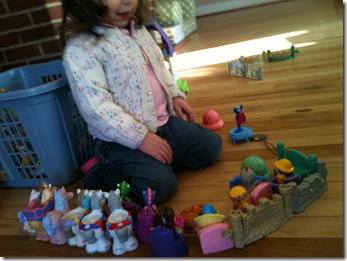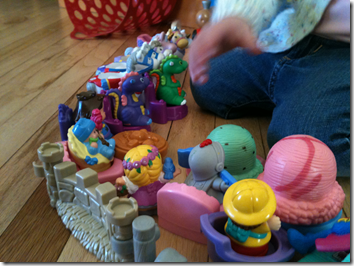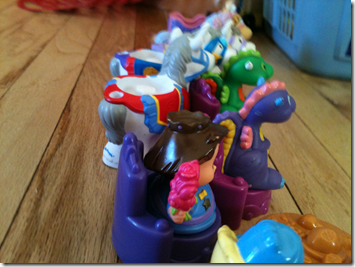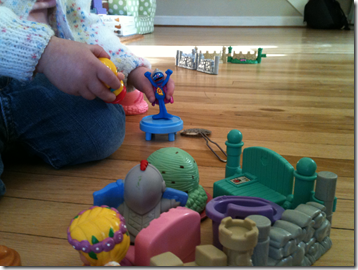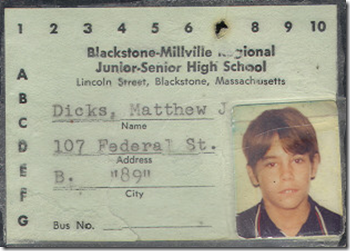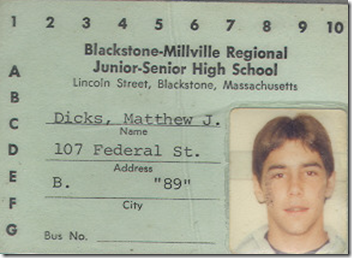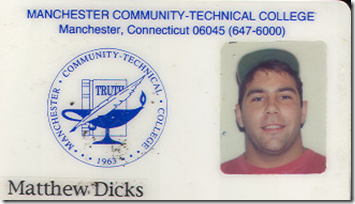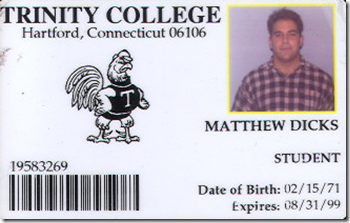Matthew Dicks's Blog, page 623
April 2, 2011
New bathroom amenities
My daughter insists on manipulating her environment whenever possible.
After blow drying her hair, my wife turned around to discover this:
CNN reads the Internet in poorly constructed segments
Watching CNN this morning while on the elliptical, the anchor announced that census data has revealed the most segregated cities in America.
The fifth most segregated city is Cleveland, followed by Detroit and Chicago.
"Want to know if you live in one of the two most segregated cities in America. Stay tuned. The rest of the list is coming at the top of the hour."
A second later, the station went to commercial.
Who does CNN think we are?
Do the producers really believe that a teaser like this will keep its viewers watching?
Annoyed with the attempt to keep me watching through commercials for detergents and cereal with their unsophisticated ploy, I switched over to ESPN. As I listened to analysts discuss their predictions for this year's American League, I opened a browser on my iPhone and had the same list that CNN was reporting on moments ago.
The top two segregated cities in America: New York and Milwaukee.
It probably took about ten seconds to have the names of the cities, and this is while working out on an elliptical using a 3G connection.
And still annoyed at CNN for their teaser nonsense, I refused to flip back to the channel when ESPN went to commercial. Instead, I went to AMC to read the sound-effect subtitles on the John Wayne western El Dorado.
Western sound-effect subtitles are often hilarious.
Is this what CNN considers news? Anchors who read the Internet to its viewers?
No, it's worse.
It's anchors who read the Internet to its viewers in annoying chunks.
When subtitles are more compelling than the news, you know that the network is doing something terribly wrong.
April 1, 2011
The ability to make fun of oneself is a sign of great intellect.
The willingness to do so is a sign of great inner strength.
Bravo, Rebecca Black. Even if your song sucks.
Friday Lyrics Analyzed with Rebecca Black from Rebecca Black
Ice cream dinner
Another peak into the mind of my daughter via her little people.
With the ponies and dragons lined up with a precision that would make my wife and I a little nervous if she weren't so incredibly social, and the rest of the people sitting in chairs, she spent about fifteen minutes preparing and feeding them ice cream dinners from her little kitchen.
Most interesting to me is (once again) the position of Super Grover, standing atop a pedestal in front of the throng of plastic people.
Super Grover remains her favorite Sesame Street character, but does this mean that she is conferring some kind of leadership position to him?
Or religious deference?
What level of organizational sophistication is a two-year old capable of?
And why no ice cream for Super Grover?
March 31, 2011
Swallowing the apology and thank you
The need for a thank you and/or the request for an apology is a clear indication of a person's likelihood to be eaten first in a zombie apocalypse.
That is, if the zombies can stomach their degree of self-importance.
Great moments in academia #3
Last year I mentioned that I had three great academic moments while in college.
The first pertained to a poem that I wrote.
The second (and perhaps my favorite) pertained to a Toni Morrison novel.
Then I forgot to write about the third.
So here it is:
My first English class at Trinity College was Feminist Literary Criticism. Six female students plus me sitting around a table with an aged female professor who scared the hell out of me.
Our first novel: To the Lighthouse by Virginia Woolf.
I have never liked Virginia Woolf's work, an opinion that was treated as sacrilege by at least two of my English professors in college. Worse still, I had difficulty understanding Woolf's work. Fresh off a three year run at Manchester Community College which culminated in membership on the USA Today Academic All American Team, I assumed that my string of academic successes with undoubtedly continue with my arrival at Trinity.
Then I began reading To the Lighthouse, and despite my best efforts, could not make sense of the book.
I think Wikipedia sums up the novel especially well:
"To the Lighthouse is a landmark novel of high modernism. The text, centering on the Ramsay family and their visits to the Isle of Skye in Scotland between 1910 and 1920, skillfully manipulates temporality and psychological exploration.
To the Lighthouse follows and extends the tradition of modernist novelists like Marcel Proust and James Joyce, where the plot is secondary to philosophical introspection, and the prose can be winding and hard to follow. The novel includes little dialogue and almost no action; most of it is written as thoughts and observations. The novel recalls the power of childhood emotions and highlights the impermanence of adult relationships. Among the book's many tropes and themes are those of loss, subjectivity, and the problem of perception."
Hard to follow.
Little dialogue.
Almost no action.
Who writes something like this?
Worse still, the size of the class prevented me from disappearing into the background. Sitting around a table twice a week with six gung-ho feminists and a professor with a passion for Woolf, I knew that I was not going to be able to avoid reading the book without being noticed.
In fact, I nearly switched over to economics during my first week at Trinity as a result of this class, which might have been a more profitable decision in terms of future earnings but considerably less satisfying overall.
But I decided to stick with it, determined to one day be a writer. But it was only through my knowledge of the Internet that I survived those first three weeks of Virginia Woolf.
It was 1996, and while the Internet was well on its way to becoming fairly ubiquitous, it was still in its infancy. Google did not yet exist. Wikipedia was years away. Search engines like Lycos and AltaVista were dominating the tiny search market.
Multinational corporations like Pepsi owned websites that looked like this:

McDonald's looked like this:

For the most part, only nerds and geeks had a complete understanding of the Internet as it existed back then, and they were the only ones capable of fully harnessing its power.
I was one of those geeks.
So rather than reading the book, I skimmed the book, seeking out every pronoun in the text unrelated to the characters and setting and then using the Internet to learn everything about them. Woolf had filled her book with literary and historical references, and I became the guy who knew everything there was to know about these references.
To a teacher who had absolutely no understanding of the Internet and six young women whose knowledge was only a smidgen greater, it appeared as if I was spending hour upon hour in the library, researching the references that I was encountering as I read the book. I never spoke a word in those discussions about anything except my nuggets of literary research, and while I went on to read the rest of the assigned novels that semester and ultimately receive an A in the class, I managed to scrape by the first two weeks of my Trinity College experience thanks to my understanding of a burgeoning little network known as the Internet.
I have not attempted to read another Virginia Woolf novel since that class, but I stumbled upon the suicide letter that she wrote to her husband before she filled her pockets with stones and drowned herself in a river.
While her handwriting was atrocious, I was pleased to see that it was I was able to read her prose just fine. It's actually a heard-wrenching letter that left me wondering how her husband managed to go on after reading it.
Virginia Woolf: crushing men's spirits no matter what she is writing.

Tuesday.
Dearest,
I feel certain that I am going mad again. I feel we can't go through another of those terrible times. And I shan't recover this time. I begin to hear voices, and I can't concentrate. So I am doing what seems the best thing to do. You have given me the greatest possible happiness. You have been in every way all that anyone could be. I don't think two people could have been happier till this terrible disease came. I can't fight any longer. I know that I am spoiling your life, that without me you could work. And you will I know. You see I can't even write this properly. I can't read. What I want to say is I owe all the happiness of my life to you. You have been entirely patient with me and incredibly good. I want to say that - everybody knows it. If anybody could have saved me it would have been you. Everything has gone from me but the certainty of your goodness. I can't go on spoiling your life any longer.
I don't think two people could have been happier than we have been.
V.
March 30, 2011
The changing faces of Matthew Dicks
For your general amusement, my school ID cards from years gone by:
Seventh grade (1983):
Ninth grade (1985):
Manchester Community College (1994)
Trinity College (1996)
Teaching perks
Yesterday a former student stopped by my class to say hello. He stood awkwardly in front of me for a second until his friend told me that he wanted a hug.
Nothing was wrong. He just hadn't seen me in a long time and missed me. And he had told his friend as much on the drive over.
Later in the day, I received an email from the same boy's brother, a student who I once taught in second grade. He is in college now and wanted help on a paper that he was writing for English class.
Some students drift in and out of your class like ships in the night, never to be seen again, and others bless you with their continued presence in your life.
I was feeling very fortunate yesterday.
And it makes me sad to think that as a student, I was often one of those ships in the night. I didn't love all my teachers, but I loved quite a few and never bothered to let them know.
I'll make it a point of finding one this week and letting him or her know.
Lemmings unwillingly launched to the sea
Lemmings don't leap off cliffs and commit commit suicide as they migrate.
It turns out that the phrase "like lemmings to the sea" is nonsense.
The metaphor derives from the 1958 Academy Award winning Disney film White Wilderness, in which staged footage was shown with lemmings jumping to their death in a scene of faked mass migration.
A Canadian Broadcasting Corporation documentary revealed that the lemmings used for White Wilderness were actually flown from Hudson Bay to Calgary, where they did not jump off the cliff, but were in fact launched off the cliff using a turntable.
And thus "like lemmings to the sea" was created.
Lemmings flung into the sea and killed using a turntable?
You can't make this stuff up.
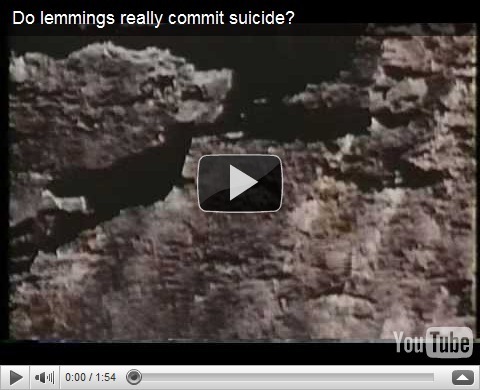
March 29, 2011
Know thyself, or just read what festival organizers have to say about you instead
My appearance at the upcoming Connecticut Book Festival has been finalized for those interested in attending. I will be speaking on Sunday from 10:00-11:00 AM at the University of Connecticut Greater Hartford Campus.
I'll then be signing books from 11:00 AM -12:00 PM.

More details to follow, including the schedules for the other authors appearing.
In examining the The Connecticut Book Festival's author website this evening, I notice that it describes me as:
"A writer and teacher who tends to deal with the quirky and/or rebellious individual, forced up against staid society."
It's so interesting (and enlightening) to hear someone else's interpretation of my work. While this description may not fit my upcoming book, it certainly applies to my first two books, as well as my currently unpublished novel (CHICKEN SHACK).
And yet, had you asked me to describe some of the common themes throughout my books, I'm not sure if I would have said anything like this.
And yet if I were to ask my friends to describe some of the ideas that are important to me, the rejection of formality, convention and meaningless tradition would probably top the list.
The mind works in mysterious ways indeed.





